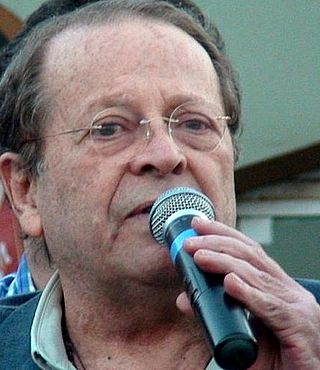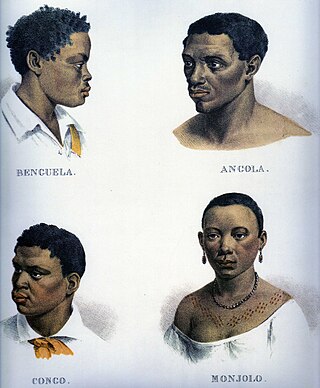Related Research Articles

The Benguela Railway is a Cape gauge railway line that runs through Angola from west to east, being the largest and most important railway line in the country. It also connects to Tenke in the Democratic Republic of the Congo (DRC), and to the Cape to Cairo Railway.

Augusto Cabrita was a Portuguese photographer, cinematographer and film director. He is best known as a leading name in photography in Portugal.

Henrique Carlos da Mata Galvão was a Portuguese military officer, writer and politician. He was initially a supporter but later become one of the strongest opponents of the Portuguese Estado Novo under António de Oliveira Salazar.

The Angolan Civil War was a civil war in Angola, beginning in 1975 and continuing, with interludes, until 2002. The war began immediately after Angola became independent from Portugal in November 1975. It was a power struggle between two former anti-colonial guerrilla movements, the communist People's Movement for the Liberation of Angola (MPLA) and the anti-communist National Union for the Total Independence of Angola (UNITA).

The Portuguese Colonial War, also known in Portugal as the Overseas War or in the former colonies as the War of Liberation, and also known as the Angolan, Guinea-Bissau and Mozambican War of Independence, was a 13-year-long conflict fought between Portugal's military and the emerging nationalist movements in Portugal's African colonies between 1961 and 1974. The Portuguese regime at the time, the Estado Novo, was overthrown by a military coup in 1974, and the change in government brought the conflict to an end. The war was a decisive ideological struggle in Lusophone Africa, surrounding nations, and mainland Portugal.
Pedro Manuel Torres, known as Mantorras, is an Angolan retired footballer who played as a striker.

José Eduardo Agualusa Alves da Cunha is an Angolan journalist and writer of Portuguese and Brazilian descent. He studied agronomy and silviculture in Lisbon, Portugal. Currently he resides in the Island of Mozambique, working as a writer and journalist. He also has been working to establish a public library on the island.
Lúcio Rodrigo Leite Barreto de Lara, also known by the pseudonym Tchiweka, was an Angolan revolutionary, physicist-mathematician, politician, anti-colonial ideologist and one of the founding members of the Popular Movement for the Liberation of Angola (MPLA). He served as General Secretary of the MPLA during the Angolan War of Independence and Angolan Civil War. Lara, a founding member of the MPLA, led the first MPLA members into Luanda on 8 November 1974. He swore in Agostinho Neto as the first president of the country.

Carlos Alberto Vereza de Almeida is a Brazilian actor. He was born in Rio de Janeiro.

"Zumbi" is a song by Brazilian samba-rock artist Jorge Ben. It appears on his 1974 album, A Tábua de Esmeralda. Its title refers to Brazilian slave settlement leader Zumbi dos Palmares. The song's lyrics describe the scene of a slave auction, ending with hopeful speculation about what will happen when Zumbi arrives. The refrain "Angola, Congo, Benguela, Monjolo, Cabinda, Mina, Quiloa, Rebolla" evokes the African origins of the slaves up for sale in the song. This vocal by Ben accompanied only by percussion is interrupted by a short, rising guitar chord, which announces the climax of the song, with the reintroduction of the sound mass of the brass and the singing taking on more passionate and dramatic contours, alternating with figurative intonations, in the final execution of the chorus, interspersed with apostrophes and some improvised vocals.

The Luanda Railway is a 424 km (263 mi) single-track Cape gauge railway line from the Angolan capital of Luanda to Malanje. A branch line departs the railway at Zenza do Itombe for Dondo. The line is operated by the state owned company Caminho de Ferro de Luanda E.P., short CFL EP.

Anchieta's serotine, formerly known as Anchieta's pipistrelle, is a species of vesper bat. It is found in Angola, Democratic Republic of the Congo, South Africa, Zambia, Zimbabwe and Madagascar. The species inhabits savanna habitats.
Walter Gerson Correia da Rocha Monteiro is a former Angolan professional basketball player. He played internationally with the Angola national basketball team. He is also a Portuguese citizen. He ended his career playing for Recreativo do Libolo at the Angolan major basketball league BAI Basket.
Sambizanga is a 1972 film directed by Sarah Maldoror and written by Maldoror, Mário Pinto de Andrade, and Maurice Pons, based on the 1961 novella The Real Life of Domingos Xavier by José Luandino Vieira. Set in 1961 during the onset of the Angolan War of Independence, it follows the struggles of Angolan militants involved with the Popular Movement for the Liberation of Angola (MPLA), an anti-colonial political movement. Maldoror co-wrote the screenplay with her husband, who was a leader within the MPLA. Sambizanga was the first feature film produced in Angola and by any Lusophone African country. Maldoror was the first woman to make a feature film in Africa.

António de Oliveira Salazar was a Portuguese statesman, academic, and economist who served as Prime Minister of Portugal from 1932 to 1968. Having come to power under the Ditadura Nacional, he reframed the regime as the corporatist Estado Novo, with himself as a dictator. The regime he created lasted until 1974, making it one of the longest-lived authoritarian regimes in modern Europe.

Ramal de Alfarelos is a railway branch in Portugal, which connects the Western Line to the Northern Line, offering a connection between Figueira da Foz and Coimbra.

Deolinda Rodrigues Francisco de Almeida was an Angolan nationalist, militant, writer, and translator, who also taught, wrote poetry, and worked as a radio host. Born into a Methodist family, she received a scholarship to study in Brazil, from where she corresponded with Martin Luther King Jr. Fearing extradition, she continued her education in the United States before returning to Angola. Rodrigues was a member of the People's Movement for the Liberation of Angola (MPLA) and co-founded its women's wing, the Organização da Mulher de Angola. She was captured, tortured, and executed by a rival nationalist group in 1967. A documentary of her life was released in 2014.

Linha do Algarve is a railway line in the region of Algarve, in southern Portugal, which connects the stations of Lagos to the west and Vila Real de Santo António to the east of the Portuguese region.
Januário Afonso is a filmmaker from São Tomé and Príncipe born in 1963. His first experience in cinema was working with Austrian filmmaker Herbert Brödl on Brödl's movie Little Fruit from the Equator (1998) which was shot in São Tomé. Afonso graduated in documentary film studies in Portugal (2006) and Scotland (2007), and obtained a law degree at São Tomé in 2016. He made feature films and documentaries on current social themes such as AIDS and domestic violence. Afonso collaborated with Angolan film director Orlando Fortunato de Oliveira on Fortunato's drama movie Batepá (2010).
References
- ↑ Orlando Fortunato de Oliveira at African Film Festival, Inc.
- ↑ W. Martin James (2018). Historical Dictionary of Angola. Rowman & Littlefield Publishers. p. 138. ISBN 978-1-5381-1123-9.
- ↑ Fernando Arenas (2011). Lusophone Africa: Beyond Independence. U of Minnesota Press. p. 232. ISBN 978-0-8166-6983-7.